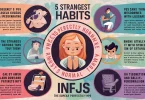The INFJ personality type is often seen as wise and mature, making them the go-to person for honest advice. However, life can sometimes disrupt their cognitive balance, causing even INFJs to need some guidance for themselves.
1. Your Ego Is Overshadowing Your Gifts
If you ask an INFJ if they feel different from others, they will likely say yes. While healthy INFJs use their uniqueness to help others without judgment, an unhealthy INFJ may see their differences as a sign of superiority. This mindset can lead them to become pretentious, believing they are better or more valuable than others. As a result, they may unfairly judge other personality types, seeing them in a negative light.
2. You’re Overanalyzing Body Language and Tone
INFJs have a natural ability to read people through their body language, facial expressions, and tone of voice. A mature INFJ uses these insights wisely, without jumping to conclusions. However, when an INFJ becomes insecure, they may start overanalyzing these cues, leading to paranoia. They might misinterpret harmless gestures or remarks as signs of dislike or exaggerated affection, which benefits no one.
3. You’re Easily Offended by Innocent Remarks
Just as they can be hypersensitive to body language, an INFJ who needs self-help might take everything personally. Without understanding their sensitive nature, they may see criticism as a personal attack, leading to a victim mentality. This can result in self-sabotage and isolation, especially since INFJs tend to be perfectionistic and hard on themselves.
4. You Avoid Disagreements at All Costs
INFJs generally prefer to avoid conflict, but an unhealthy INFJ might take this to an extreme, shutting down any discussion that challenges their viewpoint. Instead of engaging in friendly debates to understand others’ perspectives, they might cling to their own opinions, unwilling to listen to other views. This behavior often stems from past experiences or a suppressed need for harmony.
5. Your Need to Help Others Is Making You Resentful
INFJs are naturally altruistic, often feeling a strong obligation to help others. While this is usually a positive trait, it can become toxic if they haven’t learned to set boundaries. An INFJ who can’t say no may end up feeling bitter toward those they help, keeping a mental tally of their good deeds and resenting when they don’t receive enough in return.
6. Your Privacy Has Become a Shield
INFJs are introverts who value their alone time, using it to recharge. However, an INFJ who takes this need for privacy to an extreme may shut down emotionally, hiding their true thoughts and feelings out of fear of judgment. This can lead to loneliness and depression, making it difficult for them to connect with others, even those close to them.
7. You’re Using Less-Dominant Traits to Cope with Stress
When an INFJ is stressed, they might rely on less-dominant functions to manage their emotions, a phenomenon known as “falling into the grip.” This can cause them to act impulsively, engaging in behaviors that are uncharacteristic of their usual disciplined nature, such as binge-eating or overspending. While occasional indulgence isn’t necessarily harmful, repeatedly turning to these behaviors during stress is a sign that the INFJ needs help.
8. You’re Making Excuses for Toxic Behavior
INFJs have a strong ability to see the good in others, but this can become a problem when they make excuses for toxic behavior. An INFJ who is too focused on helping others might overlook red flags, allowing people to take advantage of them. They may even defend these individuals to concerned friends and family, justifying their actions despite the harm they cause.
9. Your Perfectionism Is Holding You Back
Perfectionism is common among INFJs, but for an unhealthy INFJ, it can be paralyzing. They might overthink every decision, double-checking their work multiple times and spending too much time on simple tasks. This constant self-criticism drains their motivation, making it difficult to accomplish even the smallest tasks.
10. You’re Neglecting Self-Care in Favor of Helping Others
While INFJs are often driven to help others, they must also prioritize their own well-being. An INFJ who feels overly responsible for others’ happiness might neglect their own needs, leading to burnout and disconnection from their emotions. It’s crucial for INFJs to remember that they deserve care and attention just as much as those they help.







Leave a Comment